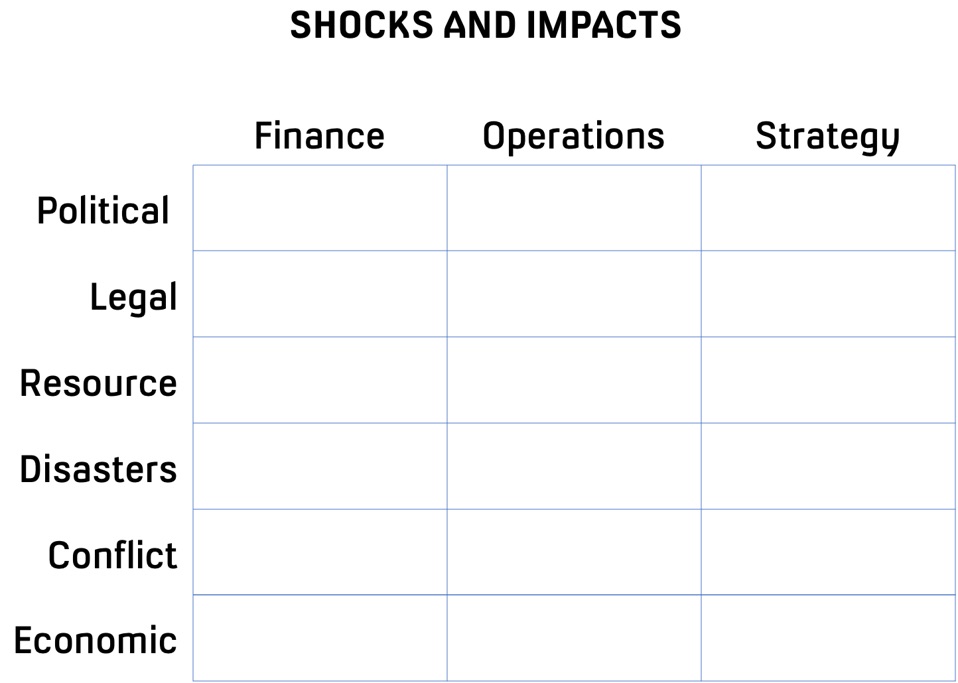As the new year kicks off, we all want to know what the future holds. Futurist pundits are sharing their trends lists. While they grab our attention, they don’t provide actual insight. Really useful insight, the kind that games luck, requires understanding your specific business and its resilience to change.
To understand this, it’s best to start with the past. If you look at the range of change over the past 100 years, you’ll quickly discover that it’s greater than the flying car laden future the talking heads have dreamed up.
How would historical change impact your organization? What innovations would be required to take advantage of them? Understanding how to take advantage of the future that has actually happened is a more powerful way to shift your luck than imagining a future that won’t.
Consider how the future will impact your business
Take a moment to think about your business. What aspects of it are most brittle to external shocks? Typically, the impacts will break down into one of three buckets.
- Financial, like asset losses, liquidity or cost of capital.
- Operational, like input costs, process reliability, or compliance.
- Strategic, like demand forecasting, pricing or investor guidance.
Typically, the shocks will break into six buckets:

Turn this year’s business shocks to your advantage
No change is necessarily a bad change, every time one company leaves the Fortune 100, a new one enters. So, be prepared to take advantage.
One way to start is to consider the major shocks of ’23 (1923 that is) and how they’ll impact your business. Many of them may sound extreme, and that’s the point. They sounded preposterous the week before they actually happened, so few were prepared. Events with similar impact could happen this year, and I’ll share evidence to support that they could.
How would the political risks of ’23 impact you?
Vladmir Lenin’s stroke in 1923 marked a sea change in the Soviet Union and led to the rise of Stalin. The incapacitation of a national leader has the potential to create uncertainty within the government and can impact the nation’s relationships with other countries and its ability to address domestic policy.
This is a risk that we must consider as we look at the current leaders of major nations. President Biden is 80, Putin is 70, and Xi is 69. If any of these leaders were to become incapacitated, it could potentially lead to a power struggle and have significant consequences for the nation and the world at large. Governments, even major governments fall. The dissolution Ottoman Empire in 1923, after 650 years, serves as a cautionary tale about the dangers of overextending oneself during times of change.
Unclear policy, the inability to plan and the impact on tradelines could make new regional investment and trade harmonization challenging. It could also increase trade protectionism and onshoring.
How would the legal risks of ’23 impact you?
In 1923, the Supreme Court ruled that Bhagat Singh Thind, a Punjabi Sikh, was not eligible for naturalized U.S. citizenship because he was not considered a “white person.” This decision was based on a narrow and discriminatory definition of personhood. While it may seem unlikely that such discrimination would occur today, core legal concepts are in the process of a broad redefinition. The overturning of Roe v. Wade this past summer limited women’s rights and expanded those of the fetus. Companies are finding themselves caught up between consumer privacy and court demands to share their data. Current cases before the court could radically curtail the enforcement authority of the EPA, increase the States rights to limit representation, expand corporate free speech and corporate liability for speech on social media platforms. Whatever the specific outcomes, businesses will need to consider the impact on interstate trade and their relationships with their constituents.
How would the natural disasters and resource issues of ’23 impact you?
In 1923, Michigan received a record snow after temperatures plummeted from 62 °F the previous day. It could also have economic consequences, as businesses and industries may be face damage to capital equipment, logistics infrastructure and disruptions to supply chains. Like in 1923, today, nearly a quarter of the US is in a severe drought. Beyond the rising cost of water and the industries that rely on it, 19.7 million people work in agriculture and food service.
How would the domestic conflicts of ’23 impact you?
The Rosewood massacre of 1923 was a tragic and devastating example of racial violence in the United States. It’s a stark reminder of how easily tensions can escalate and how destructive the consequences can be. Today, with inflation on the rise, income inequality increasing, and AI chatbots becoming more prevalent, it’s not hard to see how similar events could occur. It could also cause deep divisions and tensions within the country, potentially leading to further social unrest and conflict.
As the House GOP takes control, it has committed to investigate the investigators of the January 6 investigation and focus its aim on the Biden administration. This could lead to conflicts with the government, civil disobedience and decreased faith in government. It could also encourage similar protests to occur in future election cycles. If divides continue to widen, businesses may find themselves unable to lobby across the political spectrum and increasingly pressured to pick sides.
How would the international conflicts of ’23 impact you?
The first helicopter took off in 1923. It was more than a new mode of transportation. It changed the face of warfare and opened up new territory to exploration. In the process, it impacted geopolitical competition. Vietnam was called ‘The Helicopter War’.
Today we are seeing the rapid development of heavy lift rockets and they are changing the nature of geopolitical competition, too. The new space race will require significant resources and could disrupt existing industries. We are already seeing concerns about China taking the lead on and controlling access to the Moon. In previous eras when the US government developed an active industrial policy, the innovation priorities of firms and the locations in which high value work was done shifted along with it. For example, NASA shifted efforts from Massachusetts to Texas with the rise of the Johnson Administration.
How would the economic risks of ’23 impact you?
In 1923, the German Mark experienced a catastrophic 99.5% decrease in value. While steps have been taken to protect today’s reserve currencies, smaller currencies are still at risk. We can see this taking place today in countries like Turkey, which has the 20th largest economy in the world. In December, inflation was finally back below 70 percent. Today the Turkish Lira is worth only 1/3 as many dollars as it was before the Covid pandemic. If a major currency were to implode, it could trigger significant economic turmoil and possibly even a global financial crisis like the one that occurred in 1997 after the Thai baht plunged in value, causing the Asian Financial Crisis.
Companies must be careful about what rapid shifts in inflation and foreign exchange mean for their cost of goods and cost competitiveness.
Take the Upside of Change
Luck doesn’t need to be chance. Yes, uncertainty brings danger, but it also brings massive opportunity if you’re prepared. Each of the changes that rocked 1923 created new winners. The US was the major beneficiary of the Euro-Asiatic travails. Houston snagged NASA. Organizations like JP Morgan (who financed much of WWI) and Rice University (based in Houston) made their centuries because they were at the right place at the right time. You can create sustained strategic luck by taking the future seriously, too.
When the next round of musical chairs ends, where do you need to be seated? How do you need to innovate your Finance, Operations and Strategy functions to end up there?
I’d love to hear if this was useful and if you need clarification. Feel free to reach out to me here.



